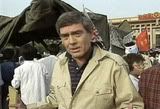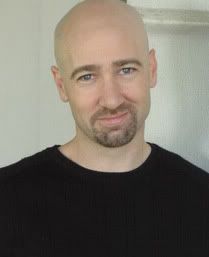China Stories Pt. 29: "Make sure the syringe is new."
One night, I got a call asking me to take someone to the hospital.
Cliff was a satellite technician. He was from Oklahoma or Texas, I think. He was probably about 50, balding with glasses. He'd one of his arms had been amputated.
One night I got a call that Cliff was sick – he was having some kind of allergic reaction, and needed to go to the hospital. He needed a car, and he needed someone to accompany him. I arranged a car, and headed downstairs.
When I got downstairs, there was an ambulance, too. Apparently, his head was swelling, and it was decided that he needed medical care more urgently. Cliff would ride in the ambulance, and I would follow in a car driven by Mr. Xu. I felt responsible for making sure Cliff didn't have anything done to him that he didn't understand and consent to. Secondly, I was there to be reassuring.
We headed out of the hotel, the ambulance ahead with its light blaring. We tried to stay with the ambulance, but since we weren't allowed legally to run lights like the ambulance, inevitably we lost it. I got mad at Mr. Xu for missing the light.
I was agitated – I was supposed to be taking care of Cliff, and now I was lost. Mr Xu told me he knew a shortcut. I was skeptical. We set off, quickly leaving the main street for a smaller street. Mr. Xu sped along in the dark, cruising through intersections without stop signs. We turned off the street into a "hu tong" – an ancient Beijing alley, still as narrow and crooked as it had been for hundreds of years. It wouldn't have taken more than a three-wheel bicycle to block our path, which would have meant backtracking. I was nervous – was Mr. Xu lost? Did he know what he was doing? I urged him to hurry. I guess I figured if we're going to get lost or stuck, we might as well get there sooner.
But we eventually emerged from the warren of alleys, and Mr Xu adeptly swerved across several lanes of the main road, and into the hospital. Cliff was just getting out of the ambulance.
Perfect, just as I’d planned. I was relieved, and I apologized to Mr. Xu for ever having doubted him.
We were led to a room, where a nurse took Cliff’s temperature.
"So, not feeling too well, huh?" I said. Ooh, nice. Smooth bedside manner there. I'm sure Cliff was impressed.
"Nope." He said simply. "I don't know what happened, I had dinner, and then I was up in my room and my head started to throb, and I got dizzy."
I didn't really know what he had looked like before, but I guessed his head was quite swollen. It was red and blotchy. His skin looked angry.
"Do you have allergies?" I asked, as I leafed through my little red English-Chinese dictionary to look up the word. (What, am I a doctor now? Just try to be helpful.)
"I have had, yes. But not to food, so I'm not sure what this might be." I can't imagine it gave Cliff a lot of comfort to be in a Chinese hospital in the middle of the night in the care of a 20 year-old carrying a dictionary.
Meanwhile, I was just thankful I'd had the presence of mind to remember the dictionary.
The doctor came in and asked some fairly basic questions, which I translated. Occasionally I looked up words. I think I had to look up dizzy. Headache, I knew.
The doctor said he thought it was an allergic reaction, and said he wanted to administer a cortisone shot. (I knew the words for injection, and eventually figured out we were talking about cortisone. I knew it wasn't opium, the one injectable thing I knew how to say in Chinese.)
I explained this to Cliff, and he thought about it. I felt that he was trying to read in me whether or not I had confidence in what was going on here. And in fact, I did believe that we were in pretty capable hands.
"Well," said Cliff, " okay. Will they use a disposable syringe? Make sure the syringe is new."
Okay, I thought. That's a good point, and I should make sure about that. When the doctor got back, I did make a point of asking him if he was using a "single-use" only syringe. Yes, he replied patiently.
"It's never been used, you say?"
"Yes," he said, this time with a hint of reproach. I think he felt mildly insulted. To me, this was reassuring.
The doctor told me that the shot would have to be given in the buttocks, which I dutifully explained to Cliff. They gestured a little, at which point Cliff began to, um, prepare for the shot. We actually talked as this was going on, about what I don't remember, but it helped break the tension.
A nurse sterilized the area where the shot would be given. Then the doctor came over, holding up the syringe, still sealed in a plastic sheath.
Cliff nodded approvingly – not an easy thing to do while bent over an exam table. Then he said, "tell him to let me know when he's going to put it in."
Just then, before I could say anything, the doctor inserted the syringe. It was a pretty physical activity, since the shot had to be into the muscle. And this was no baby syringe, either. The doctor was sort of leaning into it. Cliff was clearly a tough guy, and he endured it stoically. It was an odd moment for us to be sharing. But memorable.
We sat in the exam room for an hour or so, and then the doctor came back to check on Cliff. He was improving dramatically. Eventually, he gave Cliff another medicine, an antihistamine or something, to take later. We thanked the doctor and returned to the hotel. It was about 4 am – time for work again.



